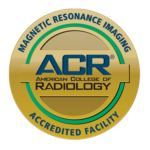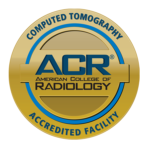Computed tomography (CT) offers a painless and non-invasive way to detect a variety of diseases and chronic health conditions. As one of the leading providers of CT scans in the Boise area, it is one of the most common procedures we perform at Intermountain Medical Imaging. CT scans are particularly useful in detecting certain types of cancer, and new studies indicate it can lower lung cancer death rates by as much as 24 percent.
How Does a CT Scan Work?
CT scans rely on advanced x-ray technology to obtain a clear, detailed look at bones, soft tissues, blood vessels, and organs such as the lungs, heart, and kidneys inside the body.
In a traditional x-ray, small amounts of radiation are directed at the specific body part being examined. At the same time, an electrical image plate placed behind the patient captures the one-dimensional images produced. With CT scans, several x-ray beams and electronic x-ray detectors are used to create pictures in wafer-thin slices, similar to the slices in a loaf of bread.
These slices are then sent to computer monitors, where they can be used to create two and even three-dimensional cross images. These images are then reviewed by our experienced radiologists, who will either load them onto a computer disc or print them on film or a 3D printer. These are then sent to your primary doctor or specialist.
How CT Scans Can Lower Lung Cancer Risk
CT scans are used frequently to detect various cancers in the body. This includes lung cancer. Typically, patients with lung cancer exhibit no warning symptoms, which makes early detection a challenge. As a result, it has become the number one cancer killer in the United States.
At IMI, we use CT lung screening to help detect lung cancer in its early stages, helping to reduce the deadliness of the disease. Recent results of studies published by the New England Journal of Medicine (NEJM) show that conducting periodic CT lung screening in certain at-risk patients can decrease the number of lung cancer deaths by as much as 24 percent.
In randomized trials of men and women between the ages of 50 and 74, CT lung screening was conducted at intervals of one, three, and 5.5 years. After a 10- year period, researchers followed up with the participants and compared results to a control group, who had undergone no CT lung scan testing. Both groups contained people at high-risk for lung cancer, including current smokers, as well as people who had quit after having smoked regularly for the previous 30 years.
The study concluded that lung cancer deaths were significantly lower among those who underwent regular screening due to early detection, which allowed for more aggressive treatment. As a result of this and other studies conducted over the past several years, some health advocacy groups are recommending CT lung scanning be performed more regularly, similar to breast cancer, colon cancer, and other types of preventative tests.
Should You Be Screened?
CT scanning may be recommended by your doctor to uncover a variety of underlying health conditions. CT lung screening, in particular, should be considered if you meet any of the following criteria:
- You are between the ages of 55 to 77 years old;
- You currently smoke or have quit at some point over the past 15 years;
- You have a 30-year history of smoking at least one pack daily or 15-year history of smoking two or more packs per day;
- You are asymptomatic, meaning that you currently do not have symptoms of lung cancer, such as chest pain, weight loss, coughing up blood, or pneumonia.
What to Expect During CT Lung Screening
The process of undergoing CT lung scanning is quick, painless, and generally takes under five minutes:
- Before your appointment, you will need to visit with your healthcare provider and complete a shared decision-making visit and fill out a questionnaire detailing your health history and any risk factors you have.
- On the day of your screening, you should wear loose clothing and leave all jewelry at home.
- During the scan, you will lie on a table while a machine uses low doses of radiation to obtain images of your lung.
- Once the scan is completed, our radiologist will interpret the results. Your referring medical provider will review these with you at your next appointment.
Schedule a Consultation at Intermountain Medical Imaging Today
Intermountain Medical Imaging has been a trusted provider of CT scanning in the area for more than 20 years. Contact your healthcare provider to schedule a consultation to see if CT Lung Screening is right for you.


